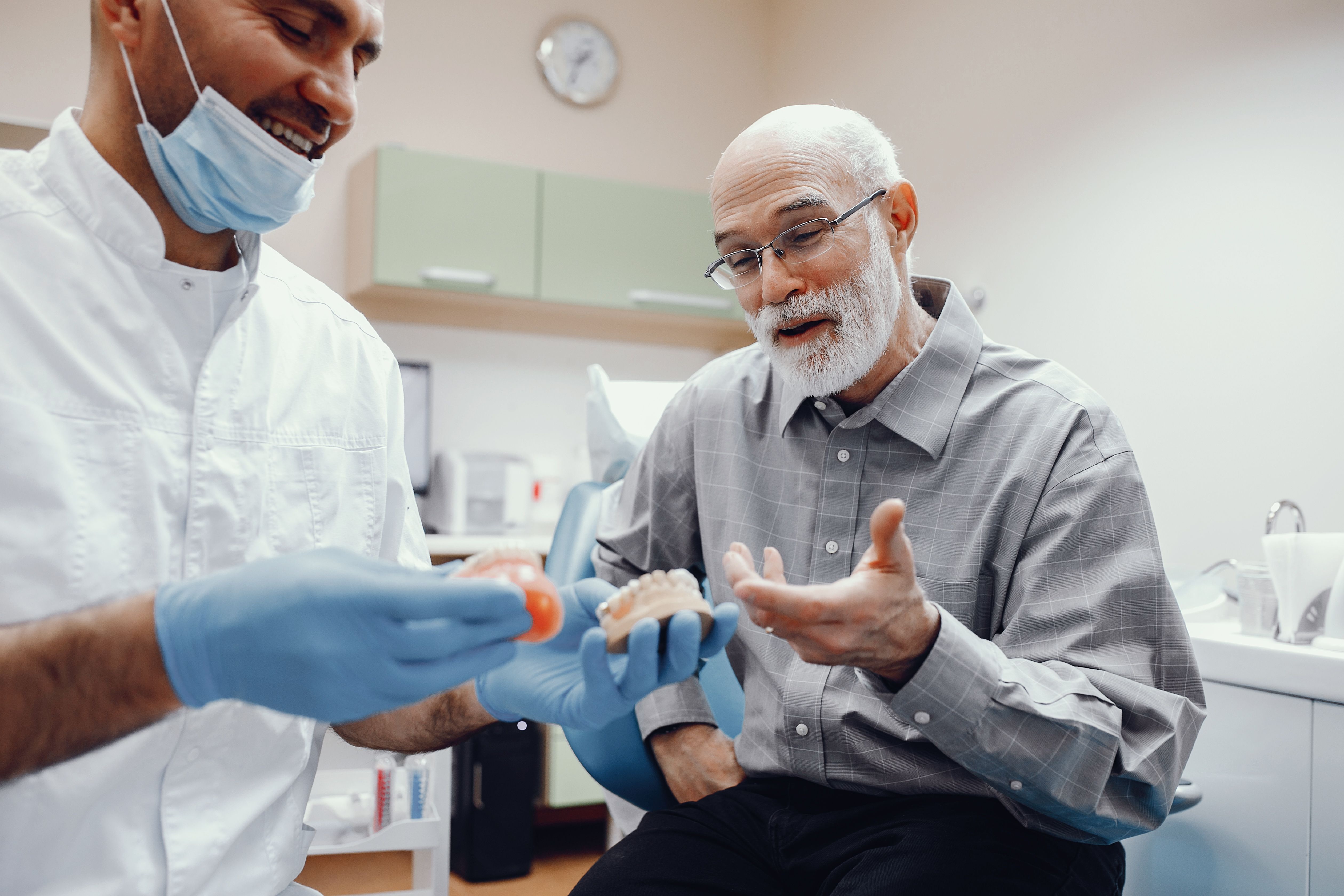Tips and Special Considerations for Dental Care in Elderly People
Dental Implants Solutions
Taking care of oral health becomes increasingly important as we age, particularly for seniors. Oral care is crucial in maintaining overall health and quality of life, yet it often receives less attention than it deserves in discussions about senior well-being. As we grow older, our mouths undergo various changes that can significantly impact oral health, making it vital to prioritize proper care and preventive measures.
In this blog, we'll provide tips for senior oral care, covering age-related changes in oral health, joint issues, and practical advice for maintaining good hygiene.
Age-Related Changes in Oral Health
Our bodies naturally change as we journey through life; oral health is no exception. The aging process brings various transformations within our mouths, significantly affecting oral health. Understanding these age-related changes is crucial for seniors and their caregivers to effectively address and adapt their oral care routines. This section will explore the most common age-related changes in oral health and their impact on dental hygiene.
- Tooth Wear and Loss:
Over time, teeth can become worn down due to years of use, grinding, or the effects of certain medications. Tooth enamel may gradually erode, making teeth more susceptible to decay and sensitivity. Additionally, tooth loss becomes more prevalent in older adults, whether due to dental issues, trauma, or other factors. Losing natural teeth can affect speech, chewing ability, and overall self-confidence.
- Gum Changes:
Aging often leads to changes in gum tissues, including decreased blood flow and thinning of gum tissues. This can increase vulnerability to gum disease, also known as periodontal disease. Gum disease can cause gum inflammation, bleeding, recession, and eventually, tooth loss if left untreated.
- Dry Mouth:
Many seniors experience a condition known as dry mouth or xerostomia. Reduced saliva flow can occur due to various factors, such as certain medications, medical treatments, or age-related changes in saliva production. A dry mouth can lead to discomfort, difficulty swallowing, increased risk of tooth decay, and oral infections.
- Changes in Taste:
The sense of taste may diminish with age, affecting the enjoyment of food and potentially leading to dietary changes. This can indirectly impact oral health by altering nutrition and eating habits.
- Decreased Sensitivity:
As we age, the nerve endings in our teeth may become less sensitive. While this might sound like relief from tooth sensitivity, it can make detecting dental problems or promptly addressing dental pain more challenging.
Maintaining Good Oral Hygiene
Brushing Technique
- Gently brush your teeth twice daily using soft-bristled and fluoride toothpaste.
- Hold the toothbrush at a 45-degree angle against your gumline and brush in gentle, circular motions.
- Ensure you brush all tooth surfaces, including the outer, inner, and chewing surfaces.
- Brush your tongue for a fresher breath and to remove bacteria.
Flossing
- Use about 18 inches of dental floss, wrapping it around your fingers and guiding it between each tooth with a gentle back-and-forth motion.
- If traditional flossing is challenging, consider using floss picks, interdental brushes, or water flossers as alternatives.
Mouthwash
- Consider using an antimicrobial mouthwash after brushing and flossing to help reduce bacteria in the mouth and freshen your breath.
- Use mouthwash with fluoride to help strengthen tooth enamel and prevent decay.
Denture Care
- If you wear dentures, remove them daily for cleaning. Use a soft brush and mild denture cleanser to clean all surfaces thoroughly.
- Rinse dentures after meals to remove food particles and plaque.
- Soak dentures overnight in a denture cleanser or water to keep them moist and maintain their shape.
Addressing Dry Mouth
- Drink plenty of water to stay hydrated. Sip water frequently, especially during meals.
- Avoid alcohol, caffeine, and sugary beverages, which can contribute to dry mouth.
- Use saliva substitutes or oral moisturizers recommended by your dentist to alleviate dry mouth symptoms.
Regular Dental Check-ups
- Schedule regular dental visits every six months or as recommended by your dentist. Dental check-ups allow for early detection and treatment of any oral health issues.

- If transportation is challenging, consider arranging home dental care services or exploring mobile dental clinics in your area.
- Remember, maintaining good oral hygiene also goes hand in hand with a healthy lifestyle. Follow a balanced diet, limit sugary snacks and beverages, avoid tobacco use, and avoid excessive alcohol consumption.
Addressing Dry Mouth
Without sufficient saliva, the mouth becomes more susceptible to tooth decay, gum disease, bad breath, and difficulty speaking and swallowing. Fortunately, some strategies and remedies can help alleviate the symptoms and improve the condition of dry mouth. Here are some tips to address dry mouth:
Stay Hydrated
- Drink water throughout the day to keep your mouth moist. Sip water regularly, especially during meals.
- Carry a water bottle with you to ensure easy access to hydration.
Stimulate Saliva Flow
- Chew sugar-free gum or suck on sugar-free candies or lozenges to stimulate saliva production. Look for products containing xylitol, as it can help prevent tooth decay.
- Avoid sugary candies or mints, as they can increase the risk of tooth decay.
Avoid Dryness-Inducing Substances
- Limit your consumption of alcohol, caffeine, and tobacco, as they can contribute to dry mouth symptoms.
- If you smoke, consider quitting, as smoking can worsen dry mouth and increase the risk of oral health problems.
Use Saliva Substitutes or Oral Moisturizers
- Over-the-counter saliva substitutes or oral moisturizers can provide temporary relief by moistening the mouth.
- Consult your dentist or pharmacist to find a suitable product and learn about proper usage.
Oral Care Routine
- Maintain a diligent oral care routine by brushing your teeth with fluoride and a soft-bristle toothbrush twice daily. Remember to brush your tongue as well.
- Floss daily to remove plaque from your teeth.
- Use an alcohol-free, moisturizing mouthwash recommended by your dentist.
Denture Care and Maintenance
Clean Dentures Daily
- Rinse your dentures under running water to remove loose debris.
- Use a soft-bristle toothbrush or denture brush specifically designed for cleaning dentures. Avoid using regular toothbrushes, which may be too abrasive and damage the denture surface.
- Gently brush all surfaces of the dentures, including the teeth, gums, and any metal clasps.
- Rinse the dentures thoroughly after brushing to remove any residual cleaning solution.
Handle Dentures with Care
- When cleaning or handling your dentures, place a towel or basin of water in the sink or on a soft surface. This will cushion the dentures if they accidentally slip from your hands and prevent damage.
- Avoid using hot water when cleaning dentures, as it can warp or deform them.
Soak Dentures Overnight
- Soak your denture in denture-cleaning solution or plain water overnight.
- Follow the manufacturer's instructions or consult your dentist to choose an appropriate denture-soaking solution.
- If you use a denture adhesive, make sure to thoroughly clean the denture before applying the adhesive again.
Take Care of Your Mouth
- After removing your dentures, clean your mouth and gums with a soft-bristle toothbrush or gauze. This helps to remove plaque and stimulate circulation in the oral tissues.
- If you have any remaining natural teeth, brush and floss them gently.
Handle Denture Repairs Professionally
- Never attempt to repair or adjust your dentures at home using household glues or adhesives. This can cause irreparable damage and may affect the fit and function of your dentures.
- If your dentures are damaged or loose, consult your dentist for professional repair or adjustment.
Store Dentures Properly
- When you're not wearing your dentures, please keep them in a case filled with water or a denture-cleansing solution. This helps to prevent them from drying out or becoming misshapen.
- Keep dentures away from young children or pets who may accidentally damage them.
Nutrition and Oral Health
Maintaining a nutritious diet is crucial for overall health and promotes optimal oral health. As seniors, paying attention to nutrition and making informed choices that support oral health is essential. Here are some key considerations regarding food and its impact on oral health:

Limit Sugary and Acidic Foods
- Reduce consumption of sugary and acidic foods and beverages, such as candies, sodas, fruit juices, and sour fruits.
- Sugary foods contribute to tooth decay and erosion, as the sugars and acids can attack tooth enamel. Opt for healthier alternatives and enjoy sugary or acidic foods in moderation.
Choose Tooth-Friendly Foods
- Incorporate fresh fruits and vegetables, whole grains, lean proteins, and low-fat dairy products into your diet.
- Foods rich in calcium, like dairy products, help strengthen teeth and bones.
- Apples and carrots can stimulate saliva flow and act as natural cleaners for your teeth.
Stay Hydrated
- Drink plenty of water to stay hydrated.
- Water helps wash away food particles, stimulates saliva production, and maintains moisture in the mouth, reducing the risk of dry mouth and related oral health issues.
Consider Nutritional Supplements
- In consultation with your healthcare provider, consider nutritional supplements, especially if you have dietary restrictions or difficulty obtaining essential nutrients from your diet alone.
- Supplements like calcium, vitamin D, and vitamin B complex can support oral health.
Vitamin C and Collagen
- Adequate vitamin C intake is crucial for healthy gums and to help prevent gum disease. Include foods rich in vitamin C, such as citrus fruits, berries, kiwi, and leafy green vegetables, in your diet.
- Collagen is an essential protein for gum health and healing. Consuming collagen-rich foods like bone broth, lean meats, and fish can support gum health.
Avoid Tobacco and Alcohol
- Smoking increases the risk of oral health problems, oral cancer, and tooth loss. If you use tobacco, consider quitting to benefit your oral health.
- Excessive alcohol consumption can also contribute to dry mouth, gum disease, and oral cancer. Limit your alcohol intake or seek professional advice on moderating consumption.
Conclusion
Maintaining good oral health is vital for seniors to enjoy a comfortable and healthy life. Our oral health changes as we age, and we face unique challenges that require special attention and care.
Therefore, taking care of your oral health is an investment in your overall health. By prioritizing senior oral care and following the tips and recommendations provided, you can continue to enjoy a healthy and vibrant smile as you age gracefully.
Contact your Walnut Creek dentist, Dr Massood Darvishzadeh, DDS at Dental Implant Solutions, to learn more about Dental Care for Elderly People.
Resource:
Full Mouth Reconstruction: 8 Ways It Improves Your Smile and Life
*This media/content or any other on this website does not prescribe, recommend, or prevent any treatment or procedure. Therefore, we highly recommend that you get the advice of a qualified dentist or other medical practitioners regarding your specific dental condition*
Subscribe To Our Newsletter
Get Updates And Learn From The Best
More To Explore



CONTACT US
Massood Darvishzadeh, DDS
2021 Mt Diablo Blvd., Suite 100A
Walnut Creek, CA 94596
(925) 939-2600info@dentalimplantsolutions.net